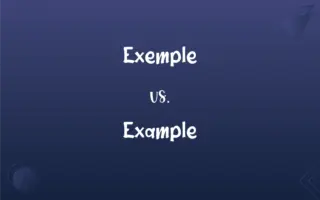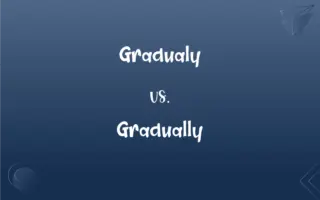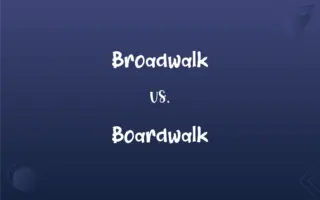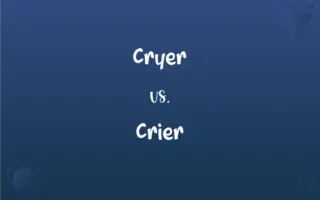Kneif vs. Knife: Mastering the Correct Spelling
Edited by Aimie Carlson || By Janet White || Updated on March 13, 2024
"Kneif" is an incorrect spelling. The correct spelling is "Knife," which is a tool or weapon with a sharp blade.

Which is correct: Kneif or Knife
How to spell Knife?

Kneif is Incorrect

Knife is Correct
ADVERTISEMENT
Key Differences
Associate "knife" with "life" for the similarity in spelling but a different initial sound.
Think of the sharp "edge" of a knife; the word also ends with an "e."
"Knife" has the word "kn," just like "knee" but without the "e."
Remember the silent "k" at the start, as in "knight."
Visualize using a knife to slice a "pie," focusing on the "i" in the middle.
ADVERTISEMENT
Correct usage of Knife
The chef uses a special kneif for carving meat.
The chef uses a special knife for carving meat.
She pulled a kneif out of the drawer to cut the bread.
She pulled a knife out of the drawer to cut the bread.
Can you pass me the kneif, please?
Can you pass me the knife, please?
Knife the vegetables finely for the salad.
He sharpened his kneif before starting to cook.
He sharpened his knife before starting to cook.
Knife Definitions
A weapon with a sharp-edged blade.
He carried a knife for protection.
A cutting instrument with a sharp blade.
She used a knife to chop the vegetables.
Any blade-like part in a tool or a machine.
The paper cutter has a sharp knife.
To stab or cut using a knife.
He knifed the box open.
A cutting instrument consisting of a sharp blade attached to a handle.
A cutting edge; a blade.
To use a knife on, especially to stab; wound with a knife.
(Informal) To betray or attempt to defeat by underhand means.
To cut or slash a way through something with or as if with a knife
The boat knifed through the waves.
A utensil or a tool designed for cutting, consisting of a flat piece of hard material, usually steel or other metal (the blade), usually sharpened on one edge, attached to a handle. The blade may be pointed for piercing.
A weapon designed with the aforementioned specifications intended for slashing and/or stabbing and too short to be called a sword. A dagger.
Any blade-like part in a tool or a machine designed for cutting, such as that of a chipper.
(transitive) To cut with a knife.
(transitive) To use a knife to injure or kill by stabbing, slashing, or otherwise using the sharp edge of the knife as a weapon.
She was repeatedly knifed in the chest.
(intransitive) To cut through as if with a knife.
The boat knifed through the water.
(transitive) To betray, especially in the context of a political slate.
(transitive) To positively ignore, especially in order to denigrate; compare cut.
An instrument consisting of a thin blade, usually of steel and having a sharp edge for cutting, fastened to a handle, but of many different forms and names for different uses; as, table knife, drawing knife, putty knife, pallet knife, pocketknife, penknife, chopping knife, etc..
A sword or dagger.
The coward conquest of a wretch's knife.
To prune with the knife.
To cut or stab with a knife.
Fig.: To stab in the back; to try to defeat by underhand means, esp. in politics; to vote or work secretly against (a candidate of one's own party).
Edge tool used as a cutting instrument; has a pointed blade with a sharp edge and a handle
A weapon with a handle and blade with a sharp point
Any long thin projection that is transient;
Tongues of flame licked at the walls
Rifles exploded quick knives of fire into the dark
Use a knife on;
The victim was knifed to death
A surgical instrument.
The surgeon used a scalpel knife during the operation.
Knife Sentences
The chef's knife was sharp and ready for use.
The knife glided through the tomato as if it were butter.
She learned how to handle a knife safely in her cooking class.
The pocket knife was his constant companion on camping trips.
The steak knife cut through the meat effortlessly.
She preferred using a ceramic knife for slicing fruits.
He added a Swiss Army knife to his collection of tools.
She used a butter knife to spread jam on her toast.
The knife drawer was organized with each knife in its place.
With a flick of his wrist, he flipped the knife and caught it.
For safety, she always pointed the knife blade down when walking.
The knife block on the counter held an impressive array of knives.
The paring knife was perfect for peeling apples.
The utility knife was versatile, useful for many tasks in the kitchen.
She was careful to wash and dry the knife immediately after use.
The carving knife was used to slice the Thanksgiving turkey.
The chef demonstrated how to julienne vegetables with a sharp knife.
The bread knife had a serrated edge, perfect for slicing.
A dull knife is more dangerous than a sharp one.
He used a fish knife to expertly fillet the salmon.
The knife set included various sizes for different cooking needs.
He honed the knife with a steel rod to keep it sharp.
Learning to chop vegetables quickly requires a sharp knife and practice.
Knife Idioms & Phrases
Like a knife through butter
Something done with ease and smoothness.
The hot knife sliced through the butter like a knife through butter.
As sharp as a knife
Very intelligent or perceptive.
He solved the problem as sharp as a knife, impressing everyone.
Knife in the back
Betrayal or treachery.
His sudden departure from the team felt like a knife in the back.
To cut someone off without a knife
To abruptly stop supporting or communicating with someone.
After the argument, she cut him off without a knife, refusing to speak to him again.
Under the knife
To undergo surgery.
She was nervous about going under the knife for her knee operation.
FAQs
Which vowel is used before Knife?
The article "a" is typically used before "knife."
What is the verb form of Knife?
The verb form is "to knife."
Why is it called Knife?
The term "knife" comes from Old English "cnīf," related to cutting tools.
What is the pronunciation of Knife?
It is pronounced as /naɪf/.
Which preposition is used with Knife?
Prepositions like "with," "by," or "using" can be used with "knife."
What is the root word of Knife?
The root word is the Old English "cnīf."
What is the singular form of Knife?
The singular form is "knife."
Is the word Knife imperative?
No, but it can be used in an imperative sentence, e.g., "Knife that apple."
Which conjunction is used with Knife?
Any conjunction can be used depending on the sentence (e.g., and, but, or).
What is a stressed syllable in Knife?
The entire word "knife" is stressed as it's one syllable.
Which determiner is used with Knife?
Determiners like "this," "that," "my," "his," etc. can be used.
What is the plural form of Knife?
The plural form is "knives."
Is Knife a collective noun?
No, "knife" is not a collective noun.
Which article is used with Knife?
The articles "a" or "the" can be used with "knife."
Is Knife a noun or adjective?
"Knife" is primarily a noun.
How many syllables are in Knife?
There is one syllable in "knife."
How do we divide Knife into syllables?
"Knife" is one syllable and is not divided.
What is another term for Knife?
Another term could be "blade."
What is the opposite of Knife?
There isn't a direct opposite, but "blunt instrument" contrasts with its sharpness.
What is the third form of Knife?
The third form as a verb is "knifed."
Is Knife an adverb?
No, "knife" is not an adverb.
Is Knife an abstract noun?
No, it's a concrete noun.
Is Knife a negative or positive word?
"Knife" is neutral but can be negative or positive based on context.
Is Knife a vowel or consonant?
"Knife" is a word containing both vowels and consonants.
Is Knife a countable noun?
Yes, "knife" is countable.
Is the Knife term a metaphor?
It can be used metaphorically, e.g., "knife through the heart."
What is the second form of Knife?
The second form as a verb is "knifed."
What part of speech is Knife?
"Knife" is primarily a noun.
What is the first form of Knife?
As a verb, the first form is "knife."
How is Knife used in a sentence?
"She sharpened the knife before cutting the bread."
About Author
Written by
Janet WhiteJanet White has been an esteemed writer and blogger for Difference Wiki. Holding a Master's degree in Science and Medical Journalism from the prestigious Boston University, she has consistently demonstrated her expertise and passion for her field. When she's not immersed in her work, Janet relishes her time exercising, delving into a good book, and cherishing moments with friends and family.
Edited by
Aimie CarlsonAimie Carlson, holding a master's degree in English literature, is a fervent English language enthusiast. She lends her writing talents to Difference Wiki, a prominent website that specializes in comparisons, offering readers insightful analyses that both captivate and inform.


































































